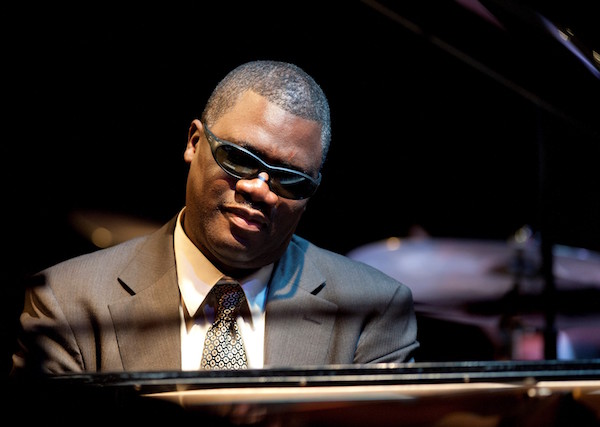Jan 13, 2026 2:09 PM
More Trump-Kennedy Center Cancellations
The fallout from the renaming of the John F. Kennedy Center for the Performing Arts to include President Donald…

Pianist Marcus Roberts interprets the music of John Coltrane on a new trio album.
(Photo: Courtesy of Artist)Say the name “John Coltrane” and what’s the first thing that comes to mind? Probably it’s that majestic tenor tone. Or maybe the cascade of notes that coursed through his improvisations, which ultimately elevated every tune he played into something more profound than even its composer had intended.
This preconception was just one of the challenges pianist Marcus Roberts faced when he, bassist Rodney Jordan and drummer Jason Marsalis decided to record Trio Crescent: Celebrating Coltrane. Released on Roberts’s J-Master Records on Nov. 17, it revisits the Coltrane quartet album Crescent, with each track in the same sequence, in the original keys and rendered at pretty much the same tempo.
Roberts made clear his intention to honor Coltrane’s work. “Ultimately, I wanted to record Crescent because I feel that you can communicate with your heroes,” the pianist explained. “This isn’t a ‘tribute record.’ We pay tribute to our grandparents and our parents every day, based on our actions toward other people. But you honor your elders by giving them respect. That’s what this is.”
Roberts and his trio had in fact been playing selections from Crescent for a while, going back to before Jordan replaced the group’s first bassist, Roland Guerin. During a run at Ronnie Scott’s Jazz Club in London, they decided to present the entire album as a single set. The crowd’s enthusiastic reaction dovetailed with the musicians’ sense that they were developing their own insights into the music.
“What made the experience unique was that our trio conception started to grow inside these performances,” Marsalis observed. “We didn’t have to make our music sound different; it started to do that organically over time.”
What about working without a fourth member to cover the tenor saxophone part? “I was blessed to get past that because I have such a deep love and admiration for Coltrane, his music and what he wanted it to represent,” Roberts answered. “His music acknowledged the civil rights struggles that were going on in the South and how he identified with Dr. Martin Luther King. He spoke truth, not in an angry way or necessarily a militant way, but through expressing love for people.”
Roberts explained his approach for compressing Crescent into a trio format: “I could never imitate what [Coltrane] did. The best I can do is take that part of his vocabulary that I can understand, the things that he and McCoy [Tyner] did that helped me discover myself through them. At that point, I can use what I know about the piano to express that knowledge.”
Before setting foot into the studio, the trio discussed the project at length. They listened to the Coltrane album together but only in the early stages of the project because, as Roberts noted, “If you keep listening, you’re probably not going to do anything of your own. Instead, we talked about how we had to play in balance for this to work. We couldn’t play too loud. There’s this illusion that Coltrane and his quartet played really loud. They didn’t; there was just a lot of power in their sound. So I said we had to make sure that we feel the emotion but play underneath it. Otherwise we’d lose the group balance and our individual perspectives.”
This mission guided Marsalis and Jordan as they prepared for their solo spots in Crescent. Marsalis said, “When I recorded ‘The Drum Thing,’ I decided to use mallets to create a different timbre from the original recording,” which featured drummer Elvin Jones. “I had my own rhythmic ideas, and I used the drum tunings I always use with our trio. But Elvin’s spirit is there alongside everything that I play.”
“I had my own take on double-stops and using space and melody in ‘Lonnie’s Lament,’ but I probably would never have thought of this had I not studied [bassist] Jimmy Garrison’s approach and personalized some of his concepts,” Jordan added. “I’d been playing ‘Lonnie’s Lament’ by myself in my personal practice time on and off for the past 10 years because it was a spiritual experience for me. I feel happy to be able to share that experience through this recording.”
“Coltrane’s music is almost religious,” Marsalis agreed. “It can sweep you away. When we play Crescent, man, no matter how you feel before you start, when you finish you feel better about your life and the world you live in.” DB

Belá Fleck during an interview with Fredrika Whitfield on CNN.
Jan 13, 2026 2:09 PM
The fallout from the renaming of the John F. Kennedy Center for the Performing Arts to include President Donald…

Peplowski first came to prominence in legacy swing bands, including the final iteration of the Benny Goodman Orchestra, before beginning a solo career in the late 1980s.
Feb 3, 2026 12:10 AM
Ken Peplowski, a clarinetist and tenor saxophonist who straddled the worlds of traditional and modern jazz, died Feb. 2…

The success of Oregon’s first album, 1971’s Music Of Another Present Era, allowed Towner to establish a solo career.
Jan 19, 2026 5:02 PM
Ralph Towner, a guitarist and composer who blended multiple genres, including jazz — and throughout them all remained…

Rico’s Anti-Microbial Instrument Swab
Jan 19, 2026 2:48 PM
With this year’s NAMM Show right around the corner, we can look forward to plenty of new and innovative instruments…

Richie Beirach was particularly renowned for his approach to chromatic harmony, which he used to improvise reharmonizations of originals and standards.
Jan 27, 2026 11:19 AM
Richie Beirach, a pianist and composer who channeled a knowledge of modern classical music into his jazz practice,…